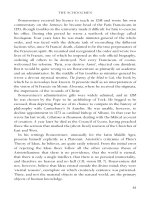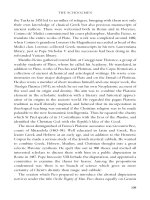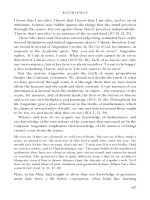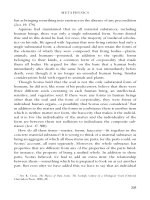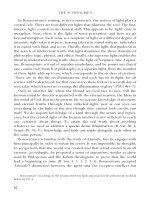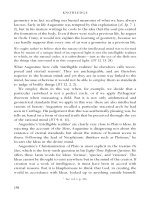Medieval philosophy a new history of western philosophy volume 2 ( PDFDrive ) 254
Bạn đang xem bản rút gọn của tài liệu. Xem và tải ngay bản đầy đủ của tài liệu tại đây (22.68 KB, 1 trang )
MIND AND SOUL
property: sensibile in actu). The importance of the truism is precisely to rule
out the naive representationalism that is tempting in this area.
In addition to the Wve outer senses, Aquinas believed that there were
inner senses, and took over a list of them from Avicenna: the general sense,
the memory, the imagination, and a fourth faculty, which in animals is
called the vis aestimativa and in humans the vis cogitativa. The vis aestimativa
seems to correspond to our notion of ‘instinct’: animals’ inborn appreciation of what is useful or dangerous, expressed in such activities as nestbuilding or Xeeing from predators. Aquinas does not succeed in making
clear what he regards as the equivalent human capacity (ST 1a 78. 4).
Many philosophers besides Aquinas have classiWed memory and imagination as inner senses. They have regarded these faculties as senses because
they saw their function as the production of imagery; they regarded them
as inner because their activity, unlike that of the outer senses, was not
controlled by external stimuli. Aquinas, indeed, thought that the inner
senses, like the outer ones, had organs—organs that were located in
diVerent parts of the brain.
It seems to be a mistake to regard the imagination as an inner sense. It
has no organ in the sense in which sight has an organ: there is no part of
the body which can be voluntarily moved so that we can imagine better,
in the way that the eyes can be voluntarily moved so that we can see
better. Moreover, it is not possible to be mistaken about what one imagines
in the way that one can be mistaken about what one sees: others cannot
check up on what I say I imagine as they can check up on what I claim
to see. These are crucial diVerences between imagination and genuine
senses.
Fortunately much of what Aquinas has to say about the role of the
imagination and its relation to the intellect is unaVected by this excessive
assimilation to the Wve senses. Calling it a sense—and therefore, for
Aquinas, a faculty wholly within the realm of the material—has the
great advantage of distinguishing it from the intellect. Many philosophers
have conceived the mind as an immaterial and private world, the locus of
our secret thoughts, the auditorium of our interior monologues. This is a
profound mistake. Of course it is undeniable that human beings can keep
their thoughts secret and talk to themselves without making any noise and
call images before their mind’s eye. But this ability, for Aquinas, is not the
mind: it is not the intellect but the imagination.
235

